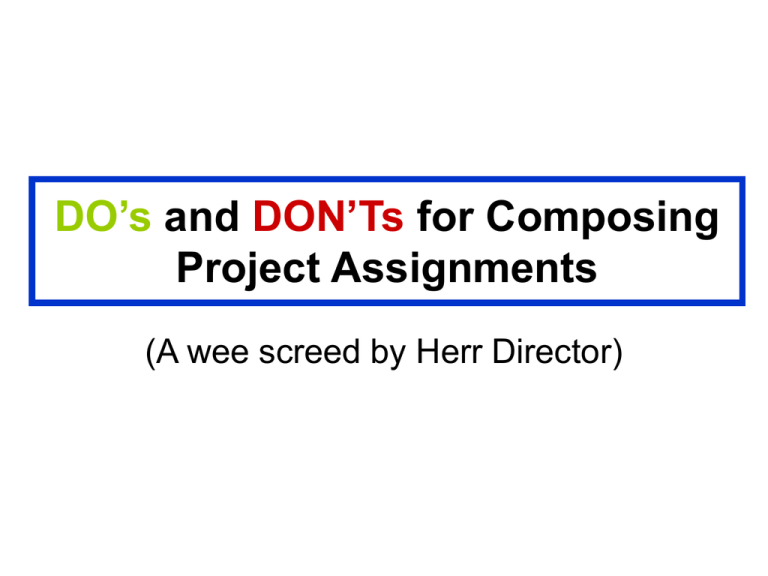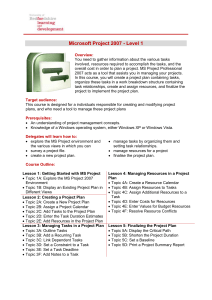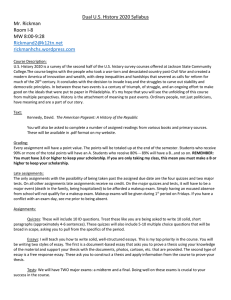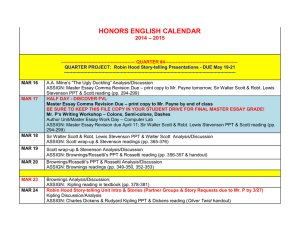DO's and DON'Ts for Composing Project Assignments
advertisement

DO’s and DON’Ts for Composing Project Assignments (A wee screed by Herr Director) DO start the assignment sheet by delineating the project itself: the situation, problem, question, task at hand. DON’T lead off with requirements of format and mechanics (length, number of sources, margins and fonts); put that stuff below. DO assign projects that call for inquirybased deliberative essay writing on subjects of broad concern. DON’T assign topics that call for literary or media analysis as such, or for report writing, or for a single narrowly formal operation. DO establish purposes for the assignment based on substantive rhetorical considerations. DON’T cite purposes that are technical, formalistic, or extrinsic to the rhetorical situation (i.e., to “improve research skills” and such). DO refer to and connect the assignment to earlier projects, texts, activities and events in the course sequence. DON’T start all over with each project, fragmenting the course narrative. DO lay out clear, thorough guidelines and directives for the project. DON’T lapse into a rhetoric of exhortation (“your essay must be clearly written, well organized, blah blah”—well duh!) or overindulge in a rhetoric of compulsion and duress (“you must,” “you’re required,” “it’s mandatory”; try “you will,” “you’re asked,” “it’s important”). DO give directions using verbs that name operations students will perform to fulfill the assignment (describe, discuss, define, compare, analyze, argue, evaluate, propose, consider, synthesize, apply, research, etc.). DON’T actually call the project a “research paper” or “comparison essay” or “definition argument” or “proposal argument” or any such formal nonentity that no one would set out to write as such. DO (a corollary) request that students support, demonstrate, give evidence for views and assertions. DON’T ask them to prove anything: they are rhetors, not scientists. And be leery of yes-no, pro-con topics that neglect the value of informed vacillation over tough, important questions. DO lay out activities and sub-assignments that will eventuate in the final draft of the project essay—especially writing about reading. DON’T assign the proto-professional genre of annotated bibliography unless you’ve got darn good reason. DO assign students to collect, cite, report on, and deploy textual sources in ways that don’t just list and summarize but rather categorize, compare, synthesize, and evaluate them. DO—if the project involves revisiting and revising earlier writing—specify how that work is to be refigured, in light of what new input or factors (further texts, evidence, inquiry; revised terms, modes, purposes, methods). DON’T just tell students not just to add more pages. DO provide ways for students to pursue topics of their choice, suited to individual interests yet relevant to the course theme and shared proceedings. DON’T instruct students to “pick a controversial issue,” thus inviting plagiarism while abrogating your responsibility to assign and guide. DO outline grading criteria for the particular project, insofar as these augment the general Program criteria found in Writing at UK, which you don’t need to repeat. DON’T divide grading into percentages for such categories as “content,” “organization,” “style,” and “mechanics,” which contrived procedure does not promote evaluation so much as impart the sense that you do not intend to read this writing as a reader. DO WRITE WELL, in direct, focused, lively, thoughtful, well-edited prose. DON’T be perfunctory. Don’t blather on. Don’t be sloppy, slack, abstracted or passive-ridden. Don’t come off as an officious stiff.





